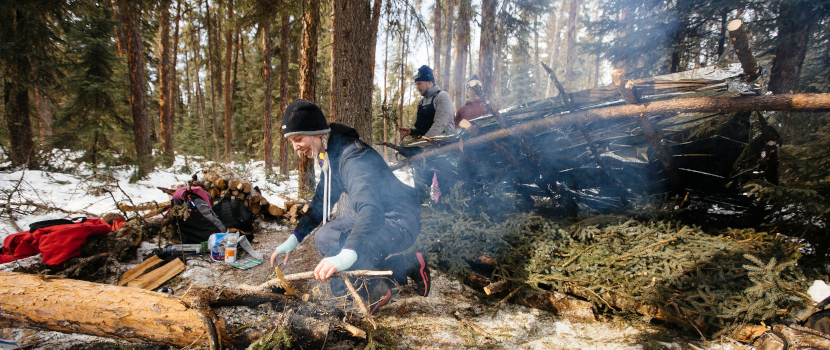
The Forest to Fork applied certificate program introduces students to three different post-secondary choices, including the Integrated Resource Management diploma, the Retail Meat Specialist applied certificate, and the Professional Cooking certificate.
Start date
Varies by brokerage
Length
20 weeks
Length and location notes
Forest to Fork is brokered through Saskatchewan (regional) Colleges for First Nations communities. Please contact your local regional college for more information.
Students learn a wide range of topics that will introduce them to the ideas of food security; beginning with plant species in Saskatchewan and their uses, processing wild meat properly and, finally, to getting it on the table with proper cooking techniques. You'll develop knowledge and practical skills in:
- provincial firearm safety
- humane trapping
- hide tanning
- plant identification
- processing beef and wild game
- cooking meats
- beading
- chainsaw safety
- wilderness survival
- maps and compassing
Career and salary information
Your career
Graduates may find employment in meat cutting and processing, with outfitters as guides, field dressers and cooks, and entrepreneurship opportunities. Successful completion of the program can also be a step towards completing Saskatchewan Polytechnic's Integrated Resource Management program.
Admissions
Admission requirements
- Open Access
Admission method
First Qualified/First Admitted
The First Qualified/First Admitted (FQFA) process is used for the majority of Saskatchewan Polytechnic programs. When we determine that you meet the program's admission requirements, you will be offered admission based on the date you fully qualify for the program. The earlier you provide the appropriate documents and information that qualify you for admission to the next intake, the earlier you might begin your studies.
Applications for all FQFA programs open September 1 each year.
Sponsored programs or programs targeted to specific groups do not accept applications year round or maintain an application pool.
See Admission Processes for more information about this method of admission.
Tuition and fees
For more information, contact Brokerages@saskpolytech.ca
Courses
Get credit for what you know
Prior Learning Assessment and Recognition
Saskatchewan Polytechnic recognizes that adults learn in many different ways. This includes acquiring knowledge and skills through life and work experience or non-formal training.
See link(s) below to get more information about PLAR.
- Candidate Guide
- Candidate Guide (Department of Arts and Sciences courses)
- communications, mathematics, sciences, social sciences
- More about PLAR
Student awards
Thanks to the generosity of donors and alumni, Saskatchewan Polytechnic gives away more than $2 million in student awards during the academic year.
Saskatchewan Polytechnic offers student awards for every certificate and diploma program at every campus. Not all student awards are based on marks - some are based on financial need or things like community or volunteer involvement.

